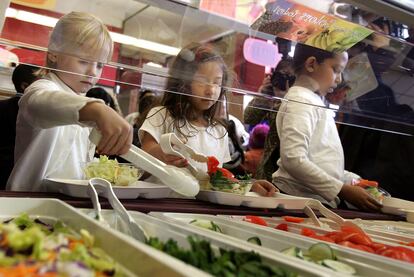Study bolsters evidence that severe obesity increasing in young US kids
Significant increases were seen in 20 states with the highest rate in California. The rise was more notable in Hispanic kids

A new study adds to evidence that severe obesity is becoming more common in young U.S. children. There was some hope that children in a government food program might be bucking a trend in obesity rates — earlier research found rates were dropping a little about a decade ago for those kids. But an update released Monday in the journal Pediatrics shows the rate bounced back up a bit by 2020.
The increase echoes other national data, which suggests around 2.5% of all preschool-aged children were severely obese during the same period.
“We were doing well and now we see this upward trend,” said one of the study’s authors, Heidi Blanck of the U.S. Centers for Disease Control and Prevention. “We are dismayed at seeing these findings.”
The study looked at children ages 2 to 4 enrolled in the Women, Infants and Children program, which provides healthy foods and other services to preschool-aged children in low-income families. The children were weighed and measured.
The researchers found that 2.1% of kids in the program were severely obese in 2010. Six years later, the rate had dipped to 1.8%. But by 2020, it was 2%. That translates to about 33,000 of more than 1.6 million kids in the WIC program.
Significant increases were seen in 20 states with the highest rate in California at 2.8%. There also were notable rises in some racial and ethnic groups. The highest rate, about 2.8%, was in Hispanic kids.
Experts say severe obesity at a very early age is nearly irreversible, and is strongly associated with chronic health problems and an early death. It’s not clear why the increase occurred, Blanck said.
When WIC obesity rates dropped, some experts attributed it to 2009 policy changes that eliminated juice from infant food packages, provided less saturated fat, and tried to make it easier to buy fruits and vegetables.
The package hasn’t changed. But “the daily hardships that families living in poverty are facing may be harder today than they were 10 years ago, and the slight increases in the WIC package just weren’t enough,” said Dr. Sarah Armstrong, a Duke University childhood obesity researcher.
The researchers faced challenges. The number of kids in WIC declined in the past decade. And the study period included 2020, the year the Covid-19 pandemic hit, when fewer parents brought their children in to see doctors. That reduced the amount of complete information available.
Despite it’s limitations, it was a “very well done study,” said Deanna Hoelscher, a childhood obesity researcher at the UTHealth Houston School of Public Health, “It gives you a hint of what’s going on.”
What’s happened since 2020 is not yet known. Some small studies have suggested a marked increase in childhood obesity — especially during the pandemic, when kids were kept home from schools, eating and bedtime routines were disrupted and physical activity decreased. “We are thinking it’s going to get worse,” Hoelscher said.
Sign up for our weekly newsletter to get more English-language news coverage from EL PAÍS USA Edition
Tu suscripción se está usando en otro dispositivo
¿Quieres añadir otro usuario a tu suscripción?
Si continúas leyendo en este dispositivo, no se podrá leer en el otro.
FlechaTu suscripción se está usando en otro dispositivo y solo puedes acceder a EL PAÍS desde un dispositivo a la vez.
Si quieres compartir tu cuenta, cambia tu suscripción a la modalidad Premium, así podrás añadir otro usuario. Cada uno accederá con su propia cuenta de email, lo que os permitirá personalizar vuestra experiencia en EL PAÍS.
¿Tienes una suscripción de empresa? Accede aquí para contratar más cuentas.
En el caso de no saber quién está usando tu cuenta, te recomendamos cambiar tu contraseña aquí.
Si decides continuar compartiendo tu cuenta, este mensaje se mostrará en tu dispositivo y en el de la otra persona que está usando tu cuenta de forma indefinida, afectando a tu experiencia de lectura. Puedes consultar aquí los términos y condiciones de la suscripción digital.








































